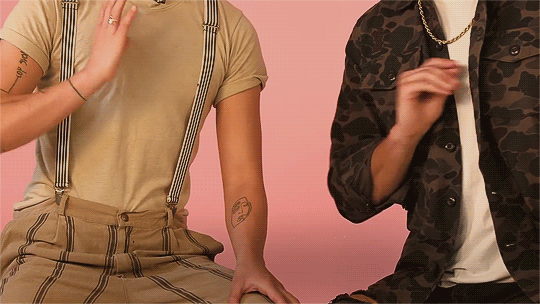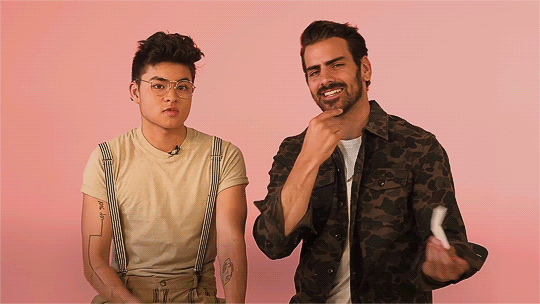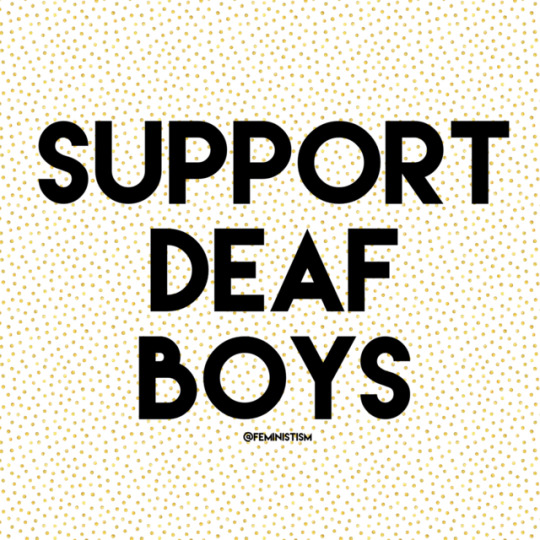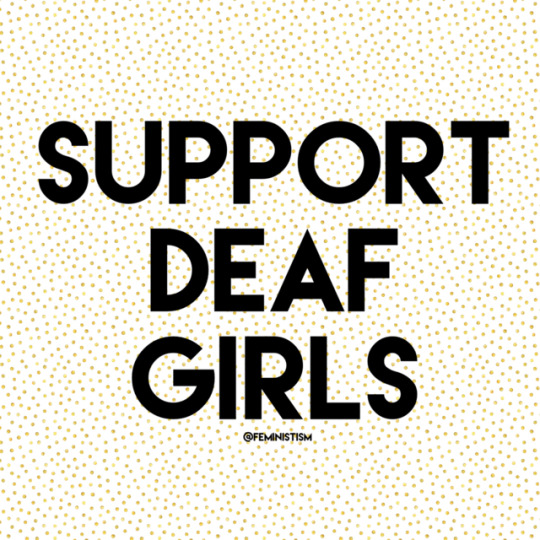Deaf Culture SideblogㅣASLㅣThey can do everything except hear!
Don't wanna be here? Send us removal request.
Photo







Nyle DiMarco & Chella Man Teach Us Queer Sign Language
103K notes
·
View notes
Text
So I found out this company is helping deaf people to find jobs.
There is an unemployment rate of 70% in the deaf and hard of hearing community. ( I know it might be a skewed figure). But this is just for your information to look up in.
70K notes
·
View notes
Text
Lipreading
Lipreading doesn’t really work if you can’t hear at all, but if you can hear some, then you kind of end up lipreading and manage to make out stuff easier with seeing lips.
Like with a lot of sounds, they look the same. I can think of one example, go to a mirror and say “pat a bat on a mat” in an ordinary way.. Then do it really exaggerated. You’ll probably notice that first off, it’s pretty hard to say…… But also, it’s pretty hard to see the difference… and saying it exaggerated doesn’t change that.
To some deaf persons, a lot of that example would look like you’re just repeating a word over and over… This is basically how most of spoken language is like. A lot of shit said over and over. It’s like the phrase “Buffalo buffalo Buffalo buffalo buffalo buffalo Buffalo buffalo”.. You don’t really understand what’s said even if there’s imposed meaning.
As a HoH person, I can go off some things though, there’s a lot of shit that blends together… And lipreading sort of distinguishes it for me. I heard only bits of sentences… Sometimes it’s more “I can hear there is sound, but jut not what exactly it is”… Like I can hear tone of voice or what kind of sound there is.
It’s kind of hard to really put words on it, but I’m going to try. When I hear and see someone speak, if someone were to say something, I would hear syllables, and I would hear some consonant… And lip movement often puts it together in my head.
But whilst this might be the case… This isn’t magic. It’s just that moreso I go off what I can hear, and lipreading becomes a distinguisher… But what must be understood is, most of lipreading relies on context and cues, and also actually hearing some things that distinguish words from each other.
Lipreading requires context and visual cues, and I would even argue some hearing, to really work. I use it basically only when it’s noisy in the environment I’m in, because that’s when I’m forced to.
648 notes
·
View notes
Text
does this new john krasinski horror film have actual deaf actors in this ASL horror film because if not what would be the point of stanning this film?
60K notes
·
View notes
Photo




Auto correct can be deadly 😂
5K notes
·
View notes
Text
the asl sign for “transgender“ is basically the same as the sign for ”beautiful“ but signed at the chest instead of in front of the face.
so that’s cool.
75K notes
·
View notes
Text
Writing Deaf Characters | People are People
I am a HoH person who has issues with the represention of deafness in media, and the lack of representation in general. I would love to see more deaf characters, but without the encumberments, so here is a guide on how. This is part two of two. Speech is Speech is a guide to writing signed language and the technicalities around it. People are People is an outline of the characterization of deaf characters and the tropes that absolutely need to be avoided.
The age trap
Characters are stereotyped into a set of traits that stem from their deafness, and are highly dependent on their age. For example, the old grandma who’s deafness is incorporated into her sweet, amicable character. “Sorry dear, didn’t quite catch that.” She says on the end of almost every sentence, and it’s supposed to be funny. Maybe it is a bit funny in a comedy skit put together by a deaf comedian, but when done by hearing people it is mocking, verging on cruel. The same is also seen in sweet, naive deaf children who are shy “because they can’t hear.”
I do understand that this character trope is really easy to fall into. I used to do it too, unthinkingly; in fact, I myself probably fit the “shy, deaf child mould” on the surface. You’re not a bad person for making this mistake, because a lot of people do. Nobody has ever thought to ask if it is wrong.
How to get around this? There are other ways to make your elderly grandparents lovely, quaint people than cramming them into the “sweet, going deaf and dentures” archetype, which frankly, is getting a little boring. You could even make them deaf/HoH from birth, have them use signed language- (even if not deaf from birth)- and throw in a fun bit of conversation where they learn the new slang from their grand-child/the MC. The representation would be such a treat for our community, and make the characters that much more interesting for your readers!
As for the children, give them character. It’s as simple as that. Deaf children may be quiet because they are told off for shouting, or mocked for never saying anything in spoken English at all; I know that’s what happened to me. Make your children quirky, and you can show that through their hearing aids/implants- in fact, please do! I knew a boy in the year below in first school. He was profoundly deaf, as was I, and he such a personality to him. And he used his hearing aids to shout that out proudly: mismatched coloured moulds for his aids that were semi-transparent and filled with glitter. Someone else I knew of- (an art teacher friend of an art teacher)- steampunk modified their hearing aids and honestly? Iconic. That being said, remember not to focus only on them; this is just a point that you can build from. People are people!
The shock of spoken language
This plot trope/device is one that just makes me incredibly sad. The deaf character uses signed language, and that makes them happy. They speak in their own language, but the hearing people act like this is not enough. The deaf character then uses spoken language, and woah- it’s a miracle, they speak perfectly, they’ve achieved greatness, what a wonder! Acceptance!
I think this stems from the “deaf and dumb” character trope seen in a lot of the literature of the 20th and earlier centuries. This was a character that would garner reader sympathy through pity for their terrible situation. They were usually unintelligent, simple girls who were tragically pretty despite their horrid imperfection. What woe! And then they spoke at a moment of intense emotion, and it was this huge deal. Although this was something that upset me as a young child reading literature in an archaic language I only just understood, I realize that, as above, this is something that has been hugely normalized.
If you are going to have your non-speaking character speak, there are a set of conditions to keep in mind:
Imperfect speech. They won’t speak incredible, perfect English, unless they’ve had extensive speech therapy and used spoken English before.
Not for your validation. The non-speaking character must choose to speak of their own free will; not to make an adult or hearing/speaking person happy. If you go down this route, make sure that you, as the author, stress that this is morally and ethically the wrong thing for that person to do.
Not as a dramatic device. Don’t have your non-speaking character suddenly speak out at a moment where you want your readers to feel Emotion, such as a horrific event or a death.
Not an acheivement or a big deal. If they use spoken English, they use spoken English. It isn’t a massive deal or event to be focused on. Doing so would do that little thing of making signed language inferior, as I made a point of in post one.
In Summary
Flesh your characters out. Give them dimensions. Extend them from their deafness. Explore different angles. Treat it as a part of their identity without retracting from them as them.
It’s important to know that although the general community treats deafness as a blessing at the most, or at least as a part of their identity and as a culture of its own, not everyone shares this. Some people chose to have implants, and some choose not to. Some people with implants still used signed language, and others use spoken.
There are different types of deafness and hearing loss as well, from hidden hearing loss to nerve damage. Here is where you can read up on these: [X]
The deaf and HoH community is as varied as any other community in any other place. There are deaf clubs and dicoes, organizations, companies, and events. All sorts of things. My favourite is the one time the National Deaf Children’s Scoiety decided to take a bunch of deaf children out on sailing boats in high wind, me in the boat with someone who only used sign. Language, support and openess differs from country to country, and if your deaf character is in a fantasy world, play with that!
What kind of hearing aids are offered, if at all? What are the stereotypes, conceptions and mis-conceptions surrounding deafness? What is the sign language like? If you’re inventing a spoken language, invent a signed one too!
Research the community in the country where your book is set if in the real world, and find out what it is like. Decide what kind of deafness your character has, too.
Is it a genetic deafness? Does is come as a part of something else? Was it from birth, or is it gradual? Hearing family, or non-hearing family? What kind of hearing loss? Read up on the types and decide.
And last of all, if you’re a hearing person and you do write a deaf character and follow these guidelines, you’re brilliant. If you’re a deaf/HoH person who has anything else to add, feel free. Input is always valued.
Thank you for taking the time to read this, and best of luck to everyone with their writing.
This is part of my weekly advice theme. Each week I look at what you’ve asked me to help with, and write a post or series of posts for it. Next week: settings and character development/rebuilding characters (including heroes, anti-heroes, villains, and every other kind of character).
2K notes
·
View notes
Text
Deafies, we need to talk.
There has truly never been a time where I thought I’d lecture some in my own community, but we have a problem among us. I love scrolling through various deaf tags on Tumblr, it’s where I can actually find a large family of people, not just dogs, or TV shows, but lately, under these tags, I’ve seen a few posts of
“We need to protest hearies not using Closed Captions on their videos by not putting them on ours when we use [your specific] sign language.” Do you guys realize that that does far more harm than good? You’re not only prohibiting hearies from our community, you’re prohibiting our very own community.
Do you know how many deafies are raised in hearing families?
How many were kept from their own culture?
How many weren’t allowed to learn sign language?
How many want to learn more about themselves, after all of these years? How many want to find others like them? How many hearies, as opposed to deafies, do you think actively search out for our videos?
Approximately 10% of d/Deah/HOH are born into deaf families.
We cannot exclude the other 90%. We cannot let someone feel like they don’t fit in on either side. It’s our job to end language deprivation. It’s our job to make our deprived feel loved and welcomed.
252 notes
·
View notes
Video
When you are Deaf and you try to listen to music but it is weather news…. :(
178K notes
·
View notes
Text
what do other people have against subtitles? like bitch,.. my ears are Not Friends with my brain, let me have my captions
#ooh i hate when i ask for CC in class and kids are like wH Y#LIKE WYM WHY????#AND THEN MY TEACHER SHUSHES ME AND SAYS NO#W H Y#reblog
0 notes
Text
So, PSA.
There is no such thing as reverse audism . (and reverse ableism)
Hearing people cannot be oppressed by d/Deaf/hard of hearing people. It’s virtually impossible. The problem is, d/Deaf/hoh people are not in the position of power, you know? Teachers are hearing. Doctors are hearing. Policiticians are hearing. Parents are hearing (in 90% of cases).
Sure, d/Deaf/hard of hearing person can be mean to hearing person. It’s also very likely they are mean to you because you are hearing. But make no mistake - they are not mean because you have ability to hear, but because of the way how you treat them and how other hearing people treated them.
Audism isn’t about hatred. Hearing people usually don’t hate d/Deaf/hoh people. But they don’t understand them (both literally and figuratively). They are afraid of them. They think that d/Deaf/hoh people are stupid and inferior. That they can’t make their own decision. That sign language isn’t a language and that Deaf culture doesn’t exist.
If you ask d/Deaf/hoh person why they hate hearing people, they can give you a long list of occassions when hearing people treated them like shit.
There is a big difference between dislike based on personal experience (what people tend to call “reverse audism”) and between systematic discrimination, oppression and erasure of the culture and language.
Case closed.
480 notes
·
View notes
Text
ASL should be taught in schools
Like seriously I think ASL (American sign language) or any type of sign language should be a language choice in school. Just knowing the basics could really help and I think it’s important for hearing (non deaf) people to maybe know a few basic signs. I’ve seen more and more people learning it and I think it’s amazing. It would just be really cool if it was a language choice at schools.
3K notes
·
View notes
Note
Can Asl be used to talk to deaf people from all over the world?
Contrary to popular belief ASL is not universal hence why it’s called American Sign Language. There is British Sign Language (BSL), Japanese Sign Language (JSL), French Sign Language (FSL) etc.
And surprisingly the one that is most similar to ASL is FSL. However they can not be used interchangeably, they are all different! Just like regular languages.
Thanks for your question!
1 note
·
View note
Text
Babies & Sign Language
Did you know that babies & toddlers can understand signs and sign back when taught? It’s known as baby sign and it’s incredibly ADORABLE!

Baby sign helps you communicate with your child before they are able to communicate with their voice. Babies can understand sign and start communicating back around 6 months old. With the use of sign language, babies have fewer tantrums because they can communicate what they want, such as more milk or their favorite toy. An added bonus of sign language: studies have shown that babies who use sign language have higher IQ’s than babies who don’t! This video does a great job explaining why baby sign is important:
youtube
Keep reading
64 notes
·
View notes
Text
I’m going to cry i just keep remembering that Baby Driver, one of the most impressive, viewed, and raved movies of all summer, used American Sign Language. It wasn’t used as some taboo thing that only “disabled people” used. It was shown as something normal to use, instead of something that was weird or scary. Deafness and sign language was normalized in this film! They definitely could’ve flipped it around and cast sign language in a negative light. I’m relieved they didn’t. I wasn’t expecting any signing at all in this movie, but when I saw it I wanted to weep from happiness. And bonus, CJ Jones, who played Joe, is actually Deaf!
2K notes
·
View notes


